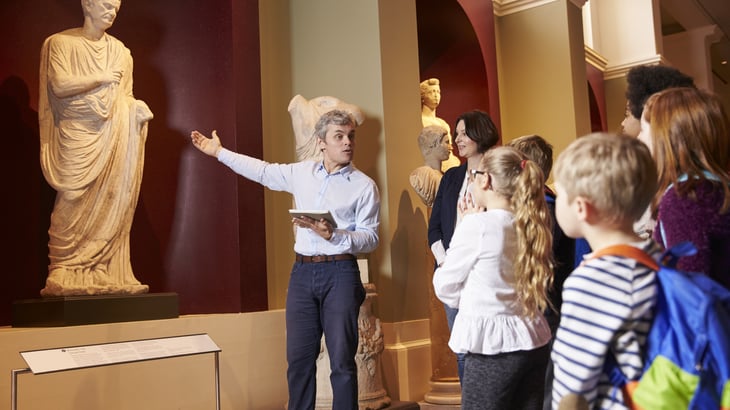Recent Posts by Joe Cox
Changing Lanes in Christ
“Stay in your lane.” It’s a sign that you’ve surely seen as you drive along the road—perhaps along a dangerous curve or amid heavy summer construction. Likely, you’ve encountered this sign much more frequently along the road of life.
Touring and Teaching in the Digital Age
Have you ever gotten stuck with a bad guide? It can dampen the excitement for even the best of journeys. Below, Joe Cox shares his experience with two very different guides and relates it to his vocation as a high school teacher.
Taking Faithful Notes on Life Lessons
I first met Ben when he was a freshman in my English class. He did something one day that I believe will stick with me for the rest of my teaching career. Every once in a while, I’ll interrupt the academic lesson with a casual thought that begins with “This is a life lesson …”
School Excellence Requires Christian Community
In my last blog, I wrote about how grace drives excellence. Particularly, I pointed out the importance for the Lutheran educator to strive toward excellence in his craft of teaching. I would like to continue with that theme as we consider that while the Lutheran educator strives for excellence as a response to the grace received by God, such excellence is impossible outside of a community.
Knowing God’s Grace, Why Settle For Mediocrity?
Grace impels excellence. St. Paul enjoins the Christians in Colossae, “to do everything in the name of the Lord Jesus Christ, giving thanks to God our Father through him” (Col. 3:17). Furthermore, he calls the Corinthian church to engage in even the most mundane of human activities, eating and drinking, “or whatever you do, do all to the glory of God” (1 Cor. 10:31).
Vocation Formation
Recently, I was having a conversation with my daughter about what she wants to be when she’s “grown up.” For some reason, something so obvious struck a chord within me that I want to share my realization if nothing more than to serve as a reminder to my readers.
The Power of Recreation
In St. Louis, a popular fundraising activity is a trivia night, in which a small group of people competes with similar groups in answering an array of questions from various categories. Of course, in our Lutheran circles, “The Bible” is a common category, and one of the questions that arises frequently is “How long did creation take?” Generally speaking, the expected answer is “six days.” However, there’s no getting around the mention of the seventh day in Genesis when “God finished His work that He had done, and He rested on the seventh day from all His work that He had done” (Genesis 2:2). So, what did God create on the seventh day? He created rest.
Law and Gospel in the Classroom
The Lutheran school system is a strange place, theologically speaking. It stands in the gap between a world of rules and a world of forgiveness. Following the scriptural insights of Martin Luther, we understand that God governs our culture according to what are traditionally referred to as the two kingdoms.
A New Normal for Christian Classrooms
Earlier this week I returned home from work despondent. I hadn’t had a “bad day.” I was simply overwhelmed. Between mask wearing and mask monitoring, trying to balance my attention between the in-class and the online students, and working to prepare for the end of the most challenging school year in my twenty years of teaching at a Lutheran school, I was just “done” for the day.
Theology of Education: Equipped to Serve
“What is your theology of education?”
It’s a question I ask candidates during those infrequent moments I find myself on an interview committee. I challenge you, dear reader, to stop for a moment and ponder that question before continuing. Go ahead … I’ll wait.




















